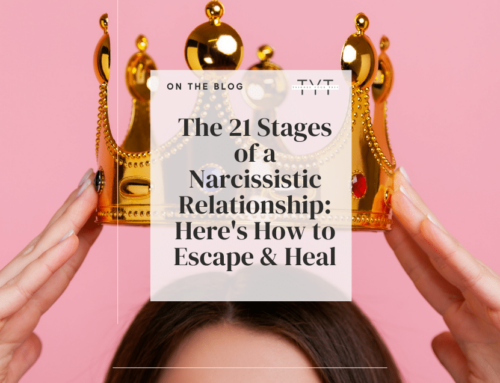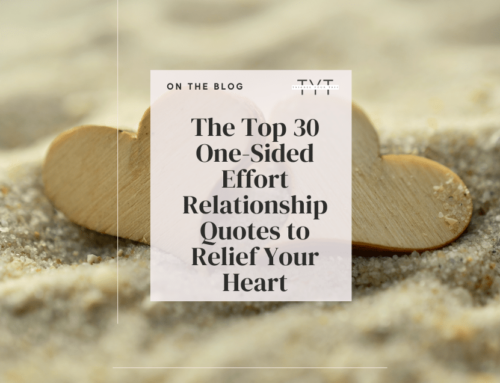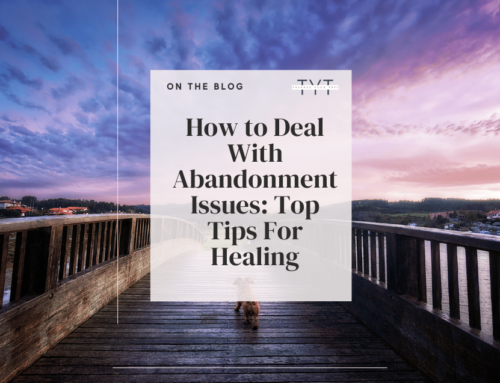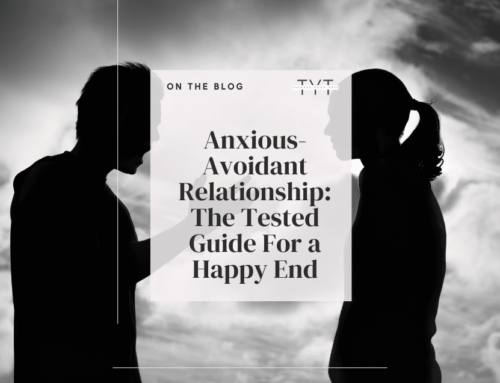Before I settled with my partner, I’d been spending years becoming emotionally attached to almost everybody I’d date (even to those who didn’t particularly interest me.) I knew I suffered from low self-esteem and an anxious attachment style, which I had been trying to heal for years. And although I acknowledged my situation, I never stop wondering why do I get attached so easily and how I can make it stop.
So, shortly after I became a relationship coach, I developed a handful of strategies and self-soothing techniques to cope with these feelings of inadequacy and obsession my anxious attachment style was causing. But before I developed those techniques, I had to find what I needed to heal by understanding my own emotions and needs. Finally, I could address whether my attachment style may have been activated or when the obvious red flags of my partner were, what I like to call, too red to ignore.
But before we proceed, I want you to know that it’s perfectly normal to seek emotional connection and support from your partner if that’s what you crave. This article is not a guide on pretending to be someone you’re not to be liked by people who can’t fulfill your needs. My advice and tips will help you understand and embrace your emotional desires while improving your self-confidence and building a more secure attachment style.
But first things first… You can’t solve a complex situation and start building healthier relationships if you don’t understand the reasons for its existence. So let’s dive into the roots of your inner self and emotional attachment.
So, Why Do I Get Attached So Easily?
High Expectations For Every Romantic Relationship
High expectations for romantic relationships can make you more prone to getting attached quickly. Setting high standards and having certain ideals or fantasies about how a relationship should be can create a strong desire for those expectations to be met. This intense desire can make you emotionally invested in someone early on, even before getting to know them.
Several factors contribute to this phenomenon, such as idealization (focusing on the positive traits and overlooking their flaws), emotional vulnerability (investing a lot of your emotional energy and hopes), fear of missing out (which can cause you to ignore red flags or rush into a deeper emotional connection before truly understanding if the relationship is healthy and compatible), and finally societal and media influences (that they often romanticize love while presenting unrealistic ideals that can shape your perceptions and expectations, making you getting attached quickly in pursuit of an idealized romance.)
While having expectations and desires in relationships is natural, striking a balance is essential.
Anxious Attachment Style
An anxious attachment style can contribute to getting attached easily in romantic relationships. People with an anxious attachment style often have a deep fear of rejection and abandonment, which can lead them to seek constant reassurance and closeness from their partners. This fear and need for comfort can make them more prone to getting attached quickly, as they constantly seek validation and security in the relationship.
They may become overly dependent on their partner and have difficulty setting boundaries, leading to a heightened sense of attachment and an intense desire always to be close to them. The underlying fear of abandonment fuels the tendency to become easily attached as they seek to alleviate their anxieties and secure their desired emotional connection.
Read more: Fearful Avoidant Attachment: 7 Signs of Craving & Fearing Love
Strong Need to Feel Complete
A solid need to feel complete can contribute to feeling attached to romantic relationships. When you deeply long to feel whole or fulfilled, you may seek out relationships with the hope that they will provide the missing pieces in your life. This need for completion can lead to an intense attachment to your partner as you perceive them as the source of your happiness and fulfillment.
Past Abusive Relationships
Past abusive relationships can contribute to feeling attached in subsequent relationships. Survivors of abuse often experience a range of complex emotions and psychological effects that can impact their attachment patterns. The trauma experienced in an abusive relationship can create a deep longing for safety, security, and love.
As a result, survivors may seek out relationships to find healing and validation. The intense emotional and physical experiences in the abusive relationship can create a distorted perception of attachment, where the familiarity of the dynamics, even if unhealthy, can feel strangely comforting.
Additionally, the vicious cycle of abuse, which typically involves periods of love and affection followed by abuse and manipulation, can create confusion and make it challenging to disentangle from the attachment.
Survivors may also fear being alone or struggle with low self-esteem, contributing to their tendency to become attached quickly in subsequent relationships.
Read more: Reactive Abuse & Narcissism: What Is It & How To Deal With It
Insecurities And Low Self Esteem
Insecurities and low self-esteem can profoundly influence attachment in romantic relationships. When you struggle with insecurities and a lack of self-worth, you may seek validation and acceptance from others, especially your partner.
Your attachment becomes driven by a constant need for reassurance and affirmation to alleviate feelings of inadequacy. Insecurity often leads to a fear of abandonment and rejection, causing you to cling tightly to the relationship for fear of losing the validation and love you derive from it.
Low self-esteem can also create a dependency on the relationship, as you rely on your partner to define your self-worth and fill the void within yourself. Breaking this cycle requires addressing and healing your insecurities, developing self-compassion, and cultivating a healthier self-image to establish more secure and balanced attachments.
Read more: The 45 Top Manifestation Affirmations to Attract Abundance
How Do I Stop Getting Attached So Easily?
- Seek professional help from a therapist
- Learn all you can about the various attachment styles
- Increase self-awareness by knowing your needs and being mindful of your expectations
- Develop self-regulation strategies for anxious behaviors
- Create a support network of healthy relationships
- Get to know the person and communicate your needs
- Challenge negative thought patterns and limiting beliefs
- Focus on self-care, practice mindfulness, and find your purpose
As an anxiously attached person seeking validation and becoming emotionally attached to almost all my dates, the above techniques helped me cope and deal with my emotional issues. I’m here to tell you that constant practice and combination are vital to healing your attachment wounds.
You can’t practice some of these helpful tips for a few weeks and suddenly expect to have a secure attachment style. Equally, don’t be disappointed if your good old anxiously attached self surface on the first trigger because it’s almost guaranteed it will happen.
The solution lies in practicing the methods above enough to become habits so that secure responses will come naturally. So, let’s explore each one in detail and how it can help you.
Seek professional help from a therapist
A therapist provides a safe and non-judgmental space to explore their emotions, patterns, and attachment style freely. Through therapy, you can better understand the root causes of your attachment issues and develop strategies to manage your feelings and behaviors more effectively.
Therapists can also provide emotional support and guide you on how to set boundaries while improving your low self-esteem. Additionally, therapy offers the opportunity for personal growth, self-reflection, and the acquisition of coping skills, enabling individuals to form healthier and more fulfilling relationships in the future.
Overall, seeking professional help from a therapist can empower you to navigate your attachment issues, enhance your emotional well-being, and foster more balanced and fulfilling connections with others.
Read more: Therapy for Narcissistic Abuse: The 5 Best Affordable Alternatives
Learn all you can about the various attachment styles
Understanding your attachment style —such as secure, anxious, avoidant, and disorganized—provides valuable insights into your patterns in every romantic relationship. By recognizing and becoming familiar with these styles, you can gain a deeper awareness of your attachment tendencies and how they might influence your relationships.
Such knowledge enables you to identify and address any unhealthy attachment behaviors or patterns in your own life that may contribute to your attachment challenges. Moreover, learning about attachment styles fosters empathy and understanding for oneself and others, leading to more compassionate and effective communication within relationships.
Ultimately, by learning all you can about attachment styles, you can develop greater self-awareness, improve emotional regulation, and work towards forming healthier and more fulfilling connections with others. Speaking of self-awareness…
Increase self-awareness by knowing your needs and expectations
Being self-aware, knowing and acknowledging your needs and the male qualities you expect from your partner is perfectly normal and one of the best ways to cultivate your emotional wellness and eliminate unfits from your love life.
An emotional connection can flourish when you know your needs, but most of all, you know how to communicate them to a person you see fit for a long-term relationship healthily and effectively. Instead of judging your desires as good, bad, or irrational, you can embrace them and feel calm with the realization that some people simply can’t or won’t fulfill them.
Your needs are not good or bad. They are your needs; some people aren’t meant for them. Your emotional dependency isn’t something to be ashamed of, and pretending to be someone you’re not will overwhelm you and lead to resentment sooner or later.
Develop self-regulation strategies for anxious behaviors
Several techniques can be helpful when it comes to self-regulation strategies for anxious behaviors and managing attachment tendencies.
Firstly, practicing mindfulness and grounding techniques can assist in staying in the present moment and reducing anxiety. This may involve deep breathing exercises, meditation, or engaging in activities that promote relaxation and self-awareness.
Setting and maintaining healthy boundaries is also crucial, as it helps establish a sense of autonomy and prevents overdependence on others.
Additionally, if you always tend to seek validation, developing self-care routines that prioritize physical and emotional well-being and make you feel good can enhance resilience and reduce anxious attachment. Remember that we tend to be attracted to people caring for their bodies and minds, as self-care activities usually equal self-love and self-confidence.
Also, engaging in activities that promote self-soothing and increase your self-worth by helping you enjoy your own company is great if you feel lonely. Some can be journaling, exercising, or spending time in nature.
Create a support network of healthy relationships
Seeking support from trusted friends, family, or a therapist can provide valuable insight and guidance in managing your anxious attachment tendencies. Ultimately, practicing self-compassion and embracing personal growth while acknowledging that attachment patterns can be challenging to change is essential for healthier relationships.
A diverse and reliable support system provides stability and security, reducing the over-reliance on a single human being for emotional fulfillment. Healthy relationships within the support network can serve as positive role models and sources of guidance, offering different perspectives and insights into managing attachment tendencies.
Trusted individuals in the network can provide a listening ear, understanding, and validation, which can help if you’re overly attached. Moreover, being surrounded by stable long-term relationships fosters a sense of belonging and connection, reducing loneliness and anxiety.
By cultivating a support network, you can diversify your sources of emotional support, develop stronger coping mechanisms, and gradually build more balanced and fulfilling connections with others.
Read more: The Top 21 Questions For A New Relationship To Develop Intimacy
Learn how to communicate and express what you need
Developing self-awareness by knowing your needs and desires is the first step. However, doing that alone is useless if you cannot communicate your expectations effectively. I’ve always wondered why do I get attached so easily to human beings that I thought were a relevant fit for fulfilling my needs, and in the end, they weren’t.
In some cases, I was surprised to find out we both wanted human connection and intimacy, but the way I asked or expressed my desires was a complete turn-off for my potential partner. Being passive-aggressive, trying to make them jealous, and waiting for them to make plans or initiate texts and sex are some of the behaviors I used to have. These behaviors witnessed my need to feel worthy and simultaneously made it difficult to form attachments that could give me that feeling of self-worth.
A clingy behavior or getting attached quickly usually makes sense for secure partners who tend to understand that deep down, you crave validation and closeness. However, if your romantic partner is avoidant, you might feel lonely and insecure if you use the wrong way of showing them what you need.
A strategy I applied in successfully stating my desires healthily and effectively was to express my feelings, expectations, and needs early on, usually after a few dates and before I fully opened up or went to bed with them.
Isn’t it pointless to keep dating a “perfect fit” (a guy who has the “package”) if he makes it clear that he is not looking for anything serious, but you are?
If I see the potential, I clarify there’s something to explore, and I’m eager to commit. Yet, I don’t neglect my life, friends, and schedule if the other person reciprocates or loves bombing. I give it time to develop while stating my expectations early on. In the first red flag, I reevaluate the expectation without throwing a drama party in my head.
Challenge negative thought patterns and limiting beliefs
I’ve purposely put that step as the last one, as hacking your subconscious mind and rewiring your brain requires extreme effort, reflection, and self-perception. It’s almost impossible to achieve without coaching or professional guidance.
However, identifying and eliminating your limiting beliefs gives you an almost superpower, making you feel invincible. Self-sabotaging, low self-esteem, imposter syndrome, or anxiety are almost always why people can’t reach their full potential and end up fulfilling their ill-fated self-prophecies, e.g., “I won’t be married out of love but out of necessity,” “I won’t find someone good enough to have kids with,” or “nobody is ever to be trusted.”
Five years ago, I was in that position, so I promised to identify all my limiting beliefs and break them individually. After reading tens of thousands of books on the subject, I created a system I practiced weekly for three months straight. I was so surprised by the mindset shift that I put all this knowledge in a guide and gifted them to a few (anxious) friends of mine. The results were astonishing. That became session number one and three in the Spiritual Guide to Good Fortune, an affordable coaching tool I created for women like you who are willing to do everything to thrive and claim what they deserve. You can check it out on Amazon.
Final Thoughts
There are several key reasons why individuals may find themselves getting attached easily in romantic relationships. High expectations, anxious attachment styles, a strong need for completeness, and insecurities with low self-esteem all contribute to this pattern. Recognizing these underlying factors is crucial for personal growth and developing healthier, more balanced relationships.
Alongside this understanding, implementing helpful strategies can make a significant difference. The seven tips in this article, including being mindful of expectations, taking time to get to know your partner, and working on personal growth, can support you in navigating attachments with greater self-awareness and emotional well-being.
By exploring the root causes, practicing self-care, and seeking professional help, you can break free from the easily-forming attachment cycle and foster more fulfilling and sustainable connections.




